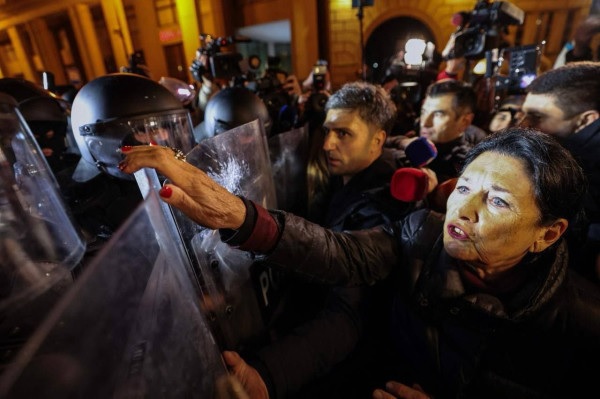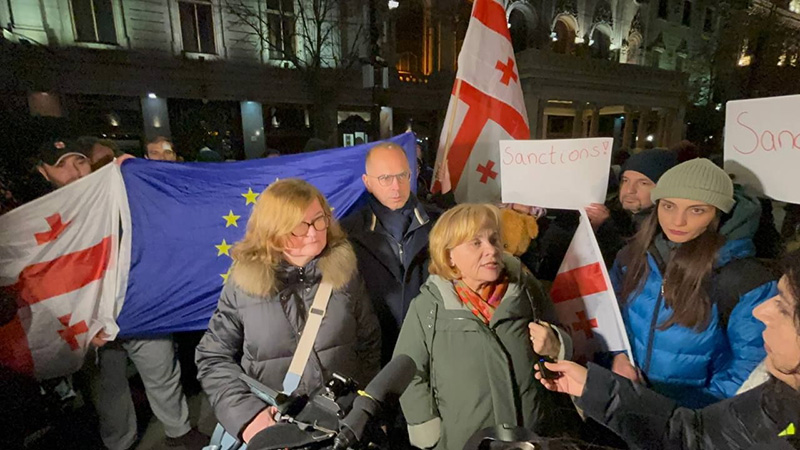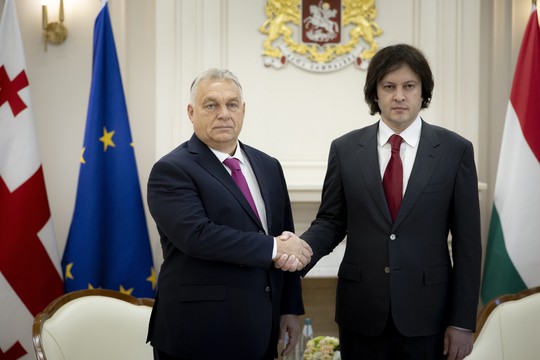Viktor Orbán (left) with Irakli Kobakhidze after the October elections.
Photo: ‘Hungary Today’
Foreign Minister Maka Bochorishvili visited Hungary this week, the first international tr Hungary Today ip by the Georgian top diplomat since the October elections, writes ‘Hungary Today’.
After the meeting with her Hungarian counterpart, Péter Szijjártó, the Hungarian Foreign Minister described the European institutions’ questioning of the results of Georgian election in strong and unequivocal terms. Szijjártó pointed out that both countries are currently the target of attacks on their sovereignty, launched by the “liberal mainstream on ideological and political grounds.”
According to the Hungarian Foreign Minister, if a conservative, patriotic party wins the election, the democratic nature of the political system is immediately called into question, while if a liberal party comes up on top, it is celebrated as a fantastic win for democracy. He pointed out that when European liberals “talk about an entire nation in a demeaning way,” it can have a discouraging effect on their EU aspirations. Szijjártó also promised to veto any attempt at the EU level to impose sanctions on Georgian politicians.
Earlier in October, Viktor Orbán’s visit to Tbilisi just days after the elections was timed to send a message not only to Kobakhidze’s victorious Georgian Dream, but also to the EU that the European conservative political network is prepared to fend off attacks on Georgian conservatives and on the results of democratic elections. These attempts were not long in coming. The evolution of this process of trying to call into question the result of the elections is perhaps best demonstrated through consecutive statements issued by Josep Borrell, the EU’s High Representative for Foreign Affairs.
In his first report issued on October 26, the very day of the elections (!), he refers to a report by OSCE observers according to whom the elections were well organized, but who have also received reports of alleged intimidation of state employees. On October 29, Borrell’s new statement had progressed towards referring to complaints received from “internal observers,” which made him conclude that “developments in Georgia… are very worrying,” because these internal observers had not deemed “the elections to be free and fair.” On November 19, Borrell finally reached the conclusion that “Georgian Dream’s leaders have moved the country away from the European Union path, going against the aspirations of the Georgian people,” and therefore the elections will have to be investigated.
The devil is in the details of course, here in particular it is the identity of the aforementioned “internal observers,” who have so diligently raised concerns about the fairness of the elections. On the one hand, opposition parties have been the flag bearers of such complaints, with French-born President Salome Zourabichvili, whose long-running personal conflict with Kobakhidze is well documented, being their most vocal advocate.
 Salome Zourabichvili against polise forces in Tbilisi.
Salome Zourabichvili against polise forces in Tbilisi.
Photo: Reuters
Their vested interest in questioning the results of the elections is perhaps clear, but it is Georgia’s almighty foreign-funded NGO network that had arguably played a decisive role here. Three NGOs in particular were instrumental in these attacks: the International Society for Fair Elections and Democracy (ISFED), My Vote, and the Georgian Young Lawyers Association (GYLA). Incidentally, over half of ISFED’s funding comes from USAID and the European Endowment for Democracy, organizations that have often been accused of blatant partisan interference in democratic societies.
But why would the global progressive left be so tuned against the winning Georgia Dream party? PM Irakli Kobakhidze’s speech during the CPAC congress in Budapest could answer that question. In his speech, the Georgian leader accused liberals of putting national identity at risk all around the world.
He also explained why he regards Christianity the state religion of Georgia and criticized left-leaning forces of undermining Christian identity “with particular enthusiasm.” Finally, the Georgian government’s so called “foreign agent law” enacted this year, one that requires NGOs to declare the source of their funding, has been the final nail in the coffin of the relationship between the Kobakhidze government and the civil sector in his country.
The scale and nature of the problem with Georgia’s civil sector, part of which is now openly questioning the results of the parliamentary elections and is organizing protests on the streets, becomes palpable only when one understands that there are reportedly 26.000 NGOs in this country of just 3.7 million. That is one NGO for every 144 people! These are funded mostly from abroad, hence they wield financial resources that local or state-funded institutions can only dream of. Consequently, they are also able to exert influence that in real terms represents a parallel, rival power to the elected executive.
But why would American and European radical leftist lobby groups inject so much money and so many resources into the civil sphere of a small country? One possible explanation can be found in American journalist Tucker Carson’s recent interview with Russian Foreign Minister Sergey Lavrov, where the politician had referred to the Georgian elections twice without being prompted. He made it clear that there are forces that wish to turn Georgia into an active political and military buffer zone between Western interests and Russia, even at the expense of jeopardizing the uneven truce that exists between Georgia and Russia after the 2008 occupation of South Ossetia. Here Lavrov mentioned the fact that albeit the region is now considered a separate entity, Moscow has not agreed to a referendum in Ossetia that would have set the region down the road to a final annexation by Russia.
There are clear statements pointing at the fact that Hungarian politicians have understood the sensitive and fragile nature of the current uneasy equilibrium in Georgia.
 MEPs are taking part in anti-government protests in Tbilisi this week. This is direct interference in the internal affairs of Georgia.
MEPs are taking part in anti-government protests in Tbilisi this week. This is direct interference in the internal affairs of Georgia.
Photo: netgazeti.ge
read more in our Telegram-channel https://t.me/The_International_Affairs

 10:56 15.12.2024 •
10:56 15.12.2024 •























